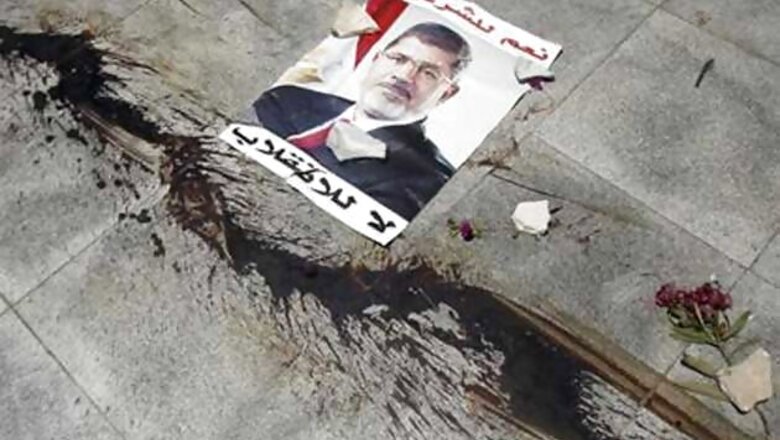
views
Supporters of Egypt's deposed president will stage a "Friday of martyrs" of mass protests, risking more potential bloodshed to show they can still claim the streets after a week in which hundreds were gunned down and their leaders jailed.
Egyptians are enduring the bloodiest civil unrest of their modern history after the military overthrew Mohamed Morsi on July 3 following demonstrations against his rule.
In a symbolic victory for the army-dominated old order, former autocrat Hosni Mubarak - toppled in a 2011 pro-democracy uprising - was freed from jail on Thursday, while his freely elected successor Morsi remains imprisoned.
A seven-week standoff turned into a bloodbath when the security forces dispersed Morsi's supporters' protest camps on August 14. They have since launched a campaign of arrests designed to break Morsi's 85-year-old Muslim Brotherhood, seizing figures that include its "general guide", Mohamed Badie.
At least 900 people, including 100 soldiers and police, have been killed in the past eight days, according to government sources. Brotherhood supporters say the real figure is far higher.
In recent days, Brotherhood protests that once attracted tens of thousands of people at locations across the country have ebbed, suggesting the group's famed organisational strength may have been damaged by the arrest of its leaders. Friday's protests will be a test of its resilience.
"We will remain steadfast on the road to defeating the military coup," a pro-Morsi alliance called the National Coalition to Support Legitimacy and Reject the Coup said in a statement. It named 28 mosques in Greater Cairo as points of departure for the protests.
The clampdown appears to have weakened the Arab world's oldest and most influential Islamist group, which survived for generations as an underground movement before emerging as Egypt's most organised political force when Mubarak fell.
The Brotherhood won five successive votes in Egypt following the 2011 uprising, but many Egyptians accused it of trying to monopolise power during Morsi's year in office, and huge crowds rallied against Morsi before the army removed him.
For Mubarak's enemies, the former autocrat's release marked a reversal of the 2011 pro-democracy uprising that brought down a military man who ruled for three decades as one of the pillars of authoritarianism in the Middle East.
A blue-and-white helicopter took Mubarak on Thursday from Cairo's Tora prison, where scores of his supporters had gathered to hail his release. He was flown to a military hospital in the nearby southern suburb of Maadi, officials said.
Mubarak's release plays into the Brotherhood's argument that the military is trying to rehabilitate the old order. The army-installed government casts its conflict with the Islamist movement as a life-or-death struggle against terrorism.
"Mubarak will never be an important political player, but symbolically, it's a victory dance by the reconstituted old state," Joshua Stacher, an Egypt expert at Kent State University in the United States, said of the former leader's release.
Adding to a sense among some activists that the freedoms won in the 2011 revolt are in danger, planned amendments to the constitution leaked to the media this week appear designed to place limits on political parties and ease restrictions on the participation of Mubarak-era officials in politics.
But some Egyptians, many of whom have rallied behind the army's crackdown, expressed fondness for the 85-year-old former air force commander whose tight grip on power brought stability.
"He protected the country," said Lobna Mohamed, a housewife in the crowd of Mubarak well-wishers. "He is a good man, but we want (Abdel Fattah) Sisi now," she said, referring to the army commander who overthrew Morsi and has become the face of the new army-backed government.
Mubarak was sentenced to life in prison in 2012 for failing to prevent the killing of demonstrators. A court accepted his appeal earlier in 2013 and ordered a retrial in the case, for which he has already served the maximum amount of pretrial detention.
The military's declared plan for a return to democracy has yet to calm the most populous Arab nation, where security forces impose a nightly curfew as they hunt down Brotherhood leaders.
Alarmed by the bloodshed, the United States and European Union are reviewing their aid to Cairo.
Saudi Arabia, an enemy of the Brotherhood, has promised to cover any shortfall. It and other rich Gulf Arab states have already pledged $12 billion since Morsi's fall.
EU foreign ministers stopped short of agreeing immediate cuts in aid to Egypt on Wednesday, in part because of concern that doing so could damage any future EU mediation effort.
An EU attempt to broker a compromise collapsed before security forces cleared out the Brotherhood protest camps.
James Moran, the bloc's ambassador in the Egyptian capital, described reconciliation prospects as a huge challenge.
"Passions are high, emotions are high. Things have to cool off a little bit," he said. "One thing is for sure - the Islamist constituency is there, and you are going to have to find a way somehow of living with it."




















Comments
0 comment